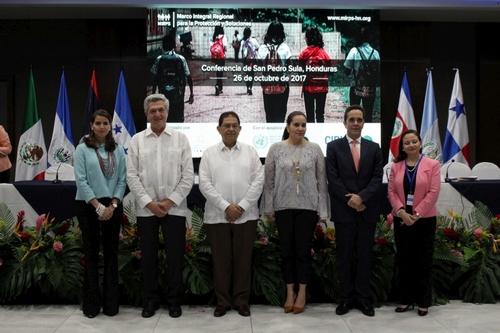North and Central American countries pledge support for Comprehensive Regional Protection and Solutions Framework
A regional conference hosted by the Government of Honduras in San Pedro Sula, concluded Thursday with a series of concrete initiatives by the countries in North and Central America to strengthen protection and solutions for asylum-seekers, internally displaced persons and refugees. States and other important stakeholders, including affected population, civil society, the private sector and the international community, have pledged strong support to all these initiatives.

North and Central Americas countries pledged to strengthen protection measures for asylum-seekers, internally displaced and refugees during the regional conference in Honduras.
These actions are part of a state-led process known as the Comprehensive Regional Protection and Solutions Framework (CRPSF), a contribution to the development of a global compact on refugees, in line with existing regional frameworks such as the Brazil Plan of Action and the San Jose Action Statement. Six countries in the region have so far joined the CRPSF through the development of national action plans and regional cooperation mechanisms.
In his opening remarks, UN High Commissioner for Refugees Filippo Grandi said that “Central America and Mexico are leading the way towards adopting the principles and aspirations of the New York Declaration and adjusting them to their current realities and needs. This shows not only high aspirations but, with political will and support, it can be translated into achievable, concrete and measurable results”.
Ana Garcia de Hernandez, Honduras’ First Lady, stressed that “ the construction of two global compacts on migration and refugees are an opportunity to give a comprehensive look at this reality, so pressing in the current historical moment, and the proof of it is that we are all here, as a demonstration of the strengths that can be achieved when we are able to define and implement joint mechanisms to address common interests, as this declaration says, to save lives, consequently, an opportunity that we cannot miss”.
In recognition of the multiple causes of displacement, the regional conference aimed at putting in place a practical mechanism that would consolidate and build on existing regional collaboration by strengthening responsibility sharing and solidarity aimed at strengthening the protection of refugees, asylum-seekers, returnees with protection concerns, and internally displaced persons.
Luis Almagro, Secretary-General of the Organization of American States (OAS) highlighted that “it is key that in this conference we can agree on practical inputs for the global refugee compact, with concrete operational actions based on the shared responsibility approach and having human beings as the center of all efforts”.
In the political declaration adopted in San Pedro Sula, the participants agreed on a number of responses, including the improvement of reception conditions; strengthening asylum systems; creating opportunities for self-reliance and local integration of refugees; as well as supporting the resilience of host communities and communities at risk.
Until mid- 2017, asylum-seekers and refugees registered worldwide from this region topped nearly 220,000 – a ten-fold increase over the last five years with most of them seeking safety in the United States, Mexico, Belize, Costa Rica, Nicaragua and Panama. Others have been forcibly displaced inside their own countries. In Honduras, 174,000 individuals have been internally displaced in the last decade in 20 out of 292 municipalities.
Among the displaced population from the region, the protection needs of unaccompanied or separated children; women; elderly; lesbian, gay, bisexual, transgender and intersex communities; indigenous people and Afro-descendants; as well as individuals with disabilities, are most acute.
The meeting, hosted by the Government of Honduras, was co-chaired by UNHCR, the UN Refugee Agency, and by the OAS, with the sponsorship of the General Secretariat of the Central American Integration System (SG-SICA), the Inter-American Commission on Human Rights (IACHR), the Inter-American Court of Human Rights and the UN system. It is one of several key events leading up to the Global Compact on Refugees to be presented to the U.N. General Assembly in September 2018.
”The success of the CRPSF will depend on the commitment of those States and other actors in the region who are directly involved in addressing the challenge of displacement. But, fundamentally, it is also based on solidarity and shared responsibility beyond the region, and it is essential that the international community is up to the occasion and supportive,” concluded Filippo Grandi, UN High Commissioner for Refugees.
Source: United Nations High Commissioner for Refugees
- 231 reads
Human Rights
Ringing FOWPAL’s Peace Bell for the World:Nobel Peace Prize Laureates’ Visions and Actions

Protecting the World’s Cultural Diversity for a Sustainable Future

The Peace Bell Resonates at the 27th Eurasian Economic Summit

Declaration of World Day of the Power of Hope Endorsed by People in 158 Nations

Puppet Show I International Friendship Day 2020

